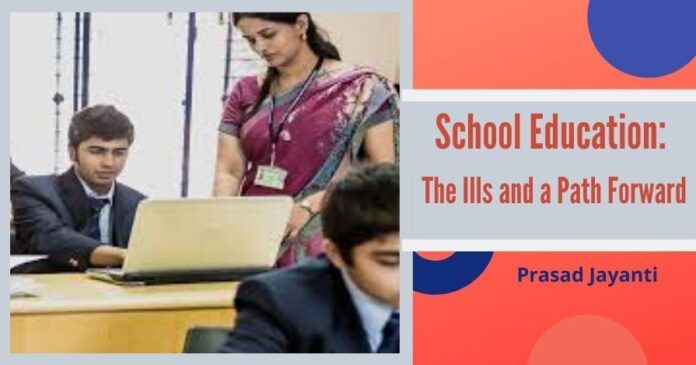
Indian elections had taken place just the previous year, and I was shocked that most of the students didn’t know the distinction between parliament and assembly.
Schools should provide an education that builds children’s confidence, kindles curiosity and creativity, and sharpens intellect, thereby paving the way for a prosperous and enlightened life. Are schools meeting this expectation? To find the answer, I took time off from my computer science research and taught students from rural schools and colleges in two summers. I was pained to observe that our schools are unwittingly working against this goal, imparting an education that shatters children’s confidence, suppresses curiosity and creativity, and blunts intellect. The culprit, I discovered, is the English-medium education. Children and even teachers, in rural and under-resourced urban schools, have little facility with English. As a result, English-medium is forcing children to learn every subject, from mathematics to history, by rote, without any understanding of the underlying concepts. The end result is that students don’t learn and lose interest in learning. I describe my experiences of this alarming ground reality in the first half of this article. In the remainder, I outline a vision to fix this malady and unleash the full potential of our children. Teaching in the mother-tongue while also imparting excellent English skills, and emphasizing conceptual understanding from the earliest years are the core elements of this vision.
Ground Realities
To understand the ground reality for the vast majority, who live in small towns and villages, I held education camps in the summers of 2014 and 2015, one for middle school children and the other for final year B.Sc. students, in a small town in Andhra Pradesh. The students that attended the camps came from private and government schools and colleges in the town and the surrounding villages. These camps were possible because of Sri Vishnu Raju, CEO of Vishnu Educational Society, who shared my passion and extended full logistic, financial, and infrastructural support.
Algorithms, which are at the core of computer science, finally started to make sense to them and learning became enjoyable.
In the middle school camp, we had 45 boys and girls whom the schools recommended, out of over three hundred that expressed interest in attending. The mathematics level of all, even in this select group of students, was far below their grade level. In particular, they didn’t know how to even add and subtract negative integers. Further, even though most children studied in English- medium, they couldn’t follow when I taught in English and hesitated to ask questions. Once I switched to explaining the concepts in Telugu, their receptivity surged: they started to engage, ask questions, and understand the concepts. The students left the camp not only with better mathematics skills but more importantly, with genuine excitement for learning.
The experience with computer science college students was even more dramatic. More than 90 students wanted to participate, so I conducted a test to select the 30 students for the camp. I designed a test that had just two simple programming problems, which were so easy that my son was sure that all 90 would answer both problems right, so the test wouldn’t serve its purpose. Alas, when the students took the test the next day, none could solve either problem and all 90 students got a 0 out of 100!
How could we explain this abysmal performance, especially when some of these students got top ranks and distinctions in their college exams? I learned that they had never been encouraged to think for themselves: the lecturer copies algorithms from the textbook to the board, which the students simply copy in their notebooks, memorize, and reproduce in the exam. In their 15 years of education prior to the camp, they were never encouraged to think about, question, or understand the substance of what they were learning.
At this camp too, it quickly became clear that English was a barrier in our communication. Once I switched to explaining in Telugu, the students started to understand the concepts. Algorithms, which are at the core of computer science, finally started to make sense to them and learning became enjoyable.
The lack of foundation was not confined to computer science. Indian elections had taken place just the previous year, and I was shocked that most of the students didn’t know the distinction between parliament and assembly. So, instead of limiting the camp to computer science, I engaged students on contemporary issues, conversational English, and Telugu literature. When I explained Sanskrit’s influence on European languages, students’ interest was aroused, leading me to introduce the Sanskrit language to them. This wholesome learning environment, which even included yoga and cricket, was so stimulating that students didn’t want to take even Sundays off. They were sobbing and unwilling to part with us on the last day, which is a testimony to how much our students enjoy learning if only the exchange happens in a language in which both the teacher and the students can express themselves clearly and comprehensively.
If we want the child to understand what we teach, there is no choice but to use that language as the medium for instruction and interaction.
The next experience is a curious phenomenon that my wife and I observed when we visited a UKG (Upper Kindergarten) classroom. Whenever we spoke to the 29 lovely four-year-old children in that room in Telugu, they responded enthusiastically. For instance, when we asked in Telugu that the girls alone rise and clap, they did. A minute later, we asked the boys to rise and clap, except that this time we spoke in English. No one responded because no one understood English. What is shocking is that this was the state of affairs even after these children were taught only in English full-day for the entire previous year of LKG. Still more, unfortunately, when children asked questions in Telugu, instead of answering, teachers would rebuke them for not speaking in English. Such rejection saps children’s enthusiasm, stunting their inquisitiveness and confidence forever.
To be continued…
Note:
1. The views expressed here are those of the author and do not necessarily represent or reflect the views of PGurus
- English medium in public school education: The Ills and a Path Forward – Part 2 - December 17, 2019
- English medium in public school education: The Ills and a Path Forward – Part 1 - December 15, 2019











That is all fine. you have not answered medium of instruction. In cosmopolitan schools it cannot be mother tongue right. you can learn state language, mother tongue, father tongue in case of mixed parentage but how do solve medium of instruction.
Teaching must always be in the local language. For people that speak a different language at home they can also learn their own mother tongue too. For example what do you think is the medium of instruction for all the kids who’s families moved to Germany from India is isn’t it German? Isn’t it French for the kids that moved to France and English for the kids who’s families moved to America and UK? If these are fine media for instruction why not the Indian languages. For people that move from state to state frequently there kendriya vidyalayas . I recommend the teaching of all the regional languages in those schools too.
Shankar Padmanabham gAru
In India the states are formed based on the language for a reason. We must respect all the languages and will have to make sure that they all survive. The way to do it is to teach that local language to everyone that resides in that state. This guarantees the survival of the state’s official language. Relatively small groups of people that live in States that speak language that’s different from their mother tongue can either pick it up on their own with the help and some simple planning by their families or with the state’s help by arranging some internet classes which is very easy in this day and age
In most cities the population is of mixed languages. Say in Cities of Maharashtra there are people of mother tongue Kannada, Telugu, Tamil, Malayalam, Gujarati, Hindi, Punjabi, Bengali, Assamese, Oriya, etc. How do you teach in Mother tongue. Solution should reflect reality and be practical.
Just geeat ..sir…
Medium of instruction must be one’s own mother tongue..which gives them true knowledge of the subject…
What do young minds gain by listening to a lecture in a foreign language….
I really wish the central government takes this issue of teaching students in their own mother tongue…
Let them study books of any language but questioning and answering, teaching concepts etc all should be done in their own mother tongue..
We have huge youth potential but all is wasted because of a foreign language guidance..
Every kid will be a super star if he is allowed to talk/ learn in his mother tongue…
Whom are we trying to appease by forcing kids to talk, learn in a foreign language…
We have come to this world only for a temporary stay n our own indian languages provide direct links to our gods…
Why should we work all our life to show our language proficiency, the skills we achieved through that etc..
To me even shashi tharoor (whom UN celebrates, left media celebrates ) is an idiot if he doesn’t know to write one simple article without mistake in his mother tongue malayalam….
And he is a criminal in god’s court no matter whatever English he choses to explain…